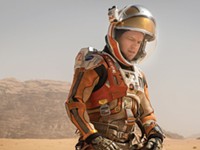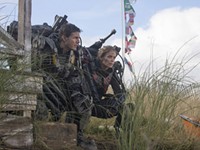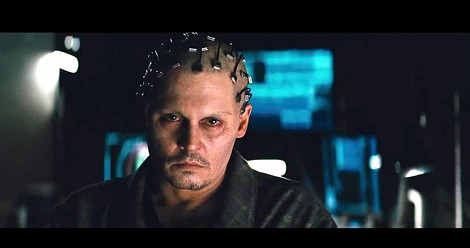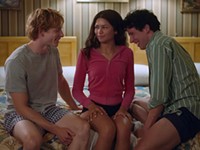[
{
"name": "500x250 Ad",
"insertPoint": "5",
"component": "15667920",
"parentWrapperClass": "",
"requiredCountToDisplay": "1"
}
]
Since the Industrial Revolution, a succession of mechanical innovations represents the ambiguous gifts of progress: the power looms of the early 19th century, the locomotive later in the same century, the automobile for most of the 20th century, and the computer in our own time. Beginning with "Colossus: The Forbin Project" back in 1970, a number of movies deal with the menace of a sentient computer -- "Demon Seed," "Westworld," for example, and most famously, Stanley Kubrick's "2001." Now "Transcendence" takes the concept further, suggesting a new dynamic between mechanism and mankind.
The picture begins in Berkeley, Calif., showing a shabby street patrolled by armed soldiers, with vegetation sprouting from cracks in sidewalks and buildings, and a shopkeeper using a laptop to prop open his door. Prose on the screen then announces a flashback to five years earlier, showing a sequence in which a brilliant computer scientist, Will Caster (Johnny Depp), explains to an adoring audience his creation of a computer that can cure diseases, end poverty and hunger, and establish a new, peaceful world. Immediately after his presentation an organization of violent Luddites whose motto is "Evolution Without Technology" attacks his laboratory, killing workers and blowing up computers full of information; worse, one of the group shoots Caster with a poisoned bullet, a wound that will kill him in a month.
Caster persuades his wife Evelyn (Rebecca Hall) and his partners (Paul Bettany and Morgan Freeman) to undertake a daring procedure, transferring the contents of his brain via electrodes to his supercomputer so that he can live on and complete his invention. Naturally, the experiment succeeds, and Caster achieves the transcendence of the title, entering the computer itself and overseeing the construction of an enormous array of electronics in the middle of a desolate prairie; from there he can control the future according to his vision.
After a good deal of talky exposition and a number of scenes showing the fulfillment of Caster's plans, the scheme unsurprisingly turns sinister. When his computers apparently start repairing DNA and thus curing the lame, the sick, and the blind, they also turn the patients into the scientist's minions, a circumstance that forces the action into something like warfare. The group of Eco terrorists, along with the government and Caster's former colleagues, stage some failed armed assaults on his gigantic computer compound, finally deciding on an ingenious solution to the problem that, like Caster's creation, appropriately combines the necessary elements of the human and the mechanical.
After its intriguing beginning and despite its exploitation of some fascinating concepts, the picture grows increasingly confused and confusing and Caster's ideas grow fuzzier as his computer self becomes more defined and powerful. Though opposed to technology and in favor of natural process, the Luddite group, for example, practices some shocking brutality and employs a considerable array of mechanisms to achieve their goals. The slow pace of most of its plot suddenly explodes into the sort of bombing and shooting that usually appears in the familiar comic book blockbusters rather than an ambitiously cerebral science fiction flick.
In the great tradition of its form, however, the film continues not only the long history of cultural ambivalence about technological progress, which needn't constitute a simple Luddite hostility, but also celebrates the grand character of our old friend, the Mad Scientist. Will Caster descends in his hubristic way from all those great creative rebels of myth and literature who break the rules, commit the forbidden deed, and transcend indeed their original state -- Prometheus, Faust, and of course, Victor Frankenstein.
With his slow, flat, careful diction, and an unwavering composure whatever the circumstances, Johnny Depp never displays anything like the kind of hysteria that so often afflicts the scientists of literature and cinema, but his dreams, like theirs, suggest an overreaching ambition that almost inevitably results in disaster. Whatever their tone or their outcome, pictures like "Transcendence" also indicate more than the ambiguity of technological progress; they hint at the widespread distrust of intelligence and learning in the culture at large, where pressure groups prevent the showing of films on evolution or the history of the universe, and political figures spout unimaginable ignorance to their constituents; not every scientist, after all, is a Mad Scientist.
Speaking of...
-

Film Review: "The Martian"
Oct 6, 2015 -

Film Review: "I Origins"
Aug 4, 2014 -

"Edge of Tomorrow"
Jun 11, 2014 - More »
Latest in Movie Reviews
More by George Grella
-

Film Review: "Cake"
Jan 26, 2015 -

Film Review: "American Sniper"
Jan 19, 2015 -

Film Review: "Inherent Vice"
Jan 12, 2015 - More »






